

Just another CSU Thinkspace site. Evaluative report. From the commencement of Knowledge Networking for Educators, there was an expectation of relevant learning, encountering new skills and continuing involvement in a networked community of practice.
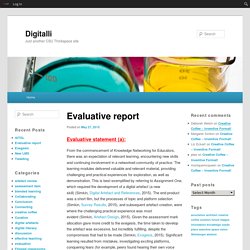
The learning modules delivered valuable and relevant material, providing challenging and practical experiences for exploration, as well as demonstration. This is best exemplified by referring to Assignment One, which required the development of a digital artefact (a new skill) (Simkin, Digital Artefact and References, 2015). Reflective statement. The following reflection adds personal perception to the evaluation which precedes it.
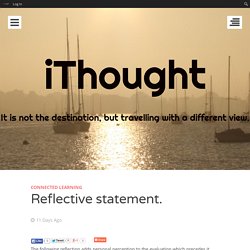
This course has certainly enriched my expertise in and understanding of, the tools and strategies of connected learning. I have been challenged (against my genetic inclinations) to compose something creative in a medium I have never used before. I have been stretched to broaden my own practice in Connected Learning (CL) through the use of forums and online applications that are familiar and await deployment, or which are simply unknown. I have read articles and blogs which have been epiphanies – and some which have stirred me little. I have enjoyed having my own prejudices reinforced and encouraged by the global energy around CL and by the experience of so many open-minded educators who are actually making this stuff work, and who are thus enhancing, some transforming, the learning experience of the kids they teach. Perhaps, I ask myself, it just isn’t there. So, where to from here? Evaluative Report. Today’s learners seek meaning, as they are bombarded with media and content.
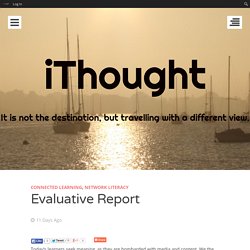
We the teachers, who are similarly overwhelmed, are meant to move students from what they need to know for the test, to what they need to know for their lives. (Wesch, 2010) The image of teachers as learners is slowly impacting education. The solution is in taking control of one’s environment as a learner. Information use is personal, it’s social, it’s ubiquitous and it’s constantly changing.
There is hope in change, say Thomas and Brown (2011). Our technological tree is outgrowing our cultural roots (Floridi, 2009) Understanding the conceptual and cultural roots is vital to the global and connected information society, and this means understanding that new information and learning environments require transforming the old way of doing things. This is the new reality for schools.
The challenge for educators is that standards of school-based literacy have not really changed. But what about the teacher? INF532 Assignment 2 part B. INF532 Ass 2 Part B: Evaluative Report Write an evaluative report on your learning in INF532 this session.
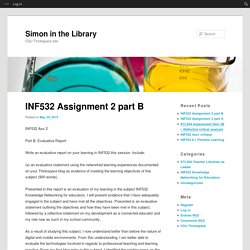
Include: (a) an evaluative statement using the networked learning experiences documented on your Thinkspace blog as evidence of meeting the learning objectives of this subject (900 words). Presented in this report is an evaluation of my learning in the subject INF532 Knowledge Networking for educators.
As a result of studying this subject, I now understand better than before the nature of digital and mobile environments. As a progression from this, further study helped my understand the social, cultural and civic and economic dimensions of the resulting management of information. This subject has presented several models of enquiry and information seeking that I was able to embed into pedagogical approaches to differentiated learning and teaching.
I now possess a creative approach to resourcing and facilitating learner engagement in a variety of forms, formats and environments. INF532 Evaluative Report. A) An evaluative statement using the networked learning experiences documented on your Thinkspace blog as evidence of meeting the learning objectives of this subject Educators need to understand the social nature of knowledge networks and the production of information to lead the members of their school communities on a process from being “knowledgeable to knowledge-able” (Wesch, 2010).
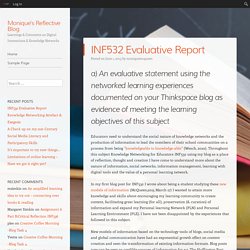
INF532 Evaluative Report. Accessing and using information has provided challenges for humans for as long as it has been recorded.
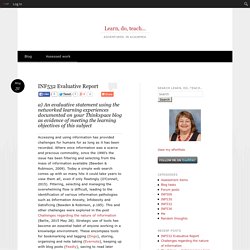
Where once information was a scarce and precious commodity, since the 1990’s the issue has been filtering and selecting from the mass of information available (Bawden & Robinson, 2009). Today a simple web search comes up with so many hits it could take years to view them all, even if only fleetingly (O’Connell, 2015). Filtering, selecting and managing the overwhelming flow is difficult, leading to the identification of various information pathologies such as Information Anxiety, Infobesity and Satisficing (Bawden & Robinson, p.185).
This and other challenges were explored in the post Challenges regarding the nature of information (Bailie, 2015 May 28). Strategic use of tools has become an essential habit of anyone working in a knowledge environment. “Blended learning is about good teaching and making the most of our online and face to face environments” (Jonson, 2014). Merrill, M.